- Home
- William Kowalski
Eddie's Bastard
Eddie's Bastard Read online
Eddie’s Bastard
A Novel
William Kowalski
For
McKinley Patrick Miller
and
In Memory of Dale
Just as the mightiest oak topples without its roots, so will a man without knowledge of his people come crashing to earth, dreamless and unfulfilled.
We cannot hope to understand ourselves until we know something of those who have come before us.
William A. Mann III
from the Diary, c. 1885
Contents
Epigraph
1
I Am Born; Grandpa Discovers Me, and I Am Named; I Learn to Read; the Ghosts; I Encounter Annie Simpson
2
Grandpa’s War Story, as Told to Me by Himself
3
My Early Childhood Continued; the Kind of Man My Father Was; the Munchkins; Grandpa Has an Accident
4
My Seventh Year Continued; I Go to the Shumachers’; I Encounter Trevor and Adam
5
My Thirteenth Year; More of Annie; The Steamroller
6
My Fourteenth Year; I Become a Man; How Willie Found the Money; the Rory Curse; I Become a Writer
7
In Which I Present My Very First Short Story, Entitled “Willie Mann and the Rory Fortune”
8
My Fifteenth Year; I Kill Mr. Simpson
9
My Sixteenth Birthday; I Am Discovered, and Elsie Moves On; Mr. Simpson’s Funeral; Grandpa Gets Better
10
My Sixteenth Year Continued; Middlism; How I Decided to Conquer the World; I Have a New Dream
11
Doctor Connor’s Letter, in Which Much Is Explained; I Visit Henry Hutchins
12
My Eighteenth Year; the Next Round of Three; I Bury Frederic Simpson; Grandpa’s Narration, and His Departure
13
Grandpa’s Wake; the End of Some Things, and the Beginnings of Others
Acknowledgments
Copyright
About the Publisher
1
I Am Born; Grandpa Discovers Me, and I Am Named; I Learn to Read; the Ghosts; I Encounter Annie Simpson
I arrived in this world the way most bastards do—by surprise. That’s the only fact about myself that I knew at the beginning of my life. At the very beginning, of course, I knew nothing. Babies are born with minds as blank as brand-new notebooks, just waiting to be written in, and I was no exception. Later, as I grew older and learned things—as the pages of the notebook, so to speak, became filled up—I began to make certain connections, and thus I discovered that among children I was unusual. Where others had a mother, I had none; father, same; birth certificate, none; name, unknown. And as soon as I was old enough to understand that babies didn’t just appear from midair, I understood that my arrival was not just a mystery to myself. It was a strange occurrence to everyone who knew me.
Nobody seemed to know where I was born, or exactly when, or to whom. Nor did anyone know where I was conceived. How, of course, was obvious. Contrary to my earliest notions, babies don’t just appear, though in my case this seemed entirely possible. Somewhere, sometime, my father had sex with my mother, and here I am.
In the space for mother, then, there is nothing but a blank.
I know who my father is—or was, rather. He was Eddie Mann, Lieutenant, USAF (dec.). The dec. stands for deceased. At one time, I had my own suspicions of who my mother was, and so did everyone else who knew me. They were all vague and unprovable, however, and suspicions are best left to the tabloids, which I read sometimes while waiting in line at the supermarket.
I confess to a weakness for tabloids; they stimulate my imagination, get me to thinking that perhaps the impossible is not so far removed as we might think. My favorite articles are the ones about Bat Boy, half human child and half bat, which someone claims to have found in a cave somewhere in the South. I sympathize with Bat Boy, even though I don’t believe in him. I imagine myself having lengthy conversations with him, teaching him how to play baseball, being his friend. Like me, his appearance was unexpected, and nobody seems to know quite what to do with him.
My imagination—the part of my mind that allows me to believe in Bat Boy—also stretches back to the time before I was born, and before. I see my mother, a pregnant young girl, panicked but with a strong conscience, and some desire to see me succeed in life. She gives birth to me in secret somewhere: a train station, a taxi, under a tree in the middle of the forest. Then, after I’m born, she—a princess, a faerie queen, Amelia Earhart—deposits me on the back steps of the ancestral Mann home in Mannville, New York, where my father had been born and raised—as had his father, and his father before him. This is where my imagination is relieved of duty and the facts take over. This part of the story really happened.
It was the third of August, 1970. My grandfather, the herbalist and failed entrepreneur Thomas Mann Junior (no relation to the writer of the same name), who lived alone and abandoned in the farmhouse, found me there. Like some character in a Dickens novel, I’d been wrapped in a blanket and placed inside a picnic basket. Many years later, I was to discover that Grandpa had saved the picnic basket, a deed for which I’ve always been profoundly grateful. For years, it was my greatest treasure. It was the one thing in the world I was sure my mother had touched.
It was just after dawn, and the day was Grandpa’s birthday. Grandpa celebrated his birthday the same way he celebrated every other day: he drank whiskey, sitting alone at the scarred and ancient kitchen table. He drank whiskey in the morning, drank it for his lunch, drank before dinner, and drank after dinner. Sometimes he didn’t bother to eat dinner at all. Eating sobered him up, and that was unpleasant; he preferred to be drunk. But today there was something unusual going on, something to break the monotony of his drunkenness. It was my crying. Grandpa heard it dimly, out of the corner of his ear, as it were. It sounded familiar. It was a noise he’d heard before, but he couldn’t quite place it.
“Chickens,” he said to himself. I know he said this because later he was to tell me the whole story over and over again. There were no chickens left on our farm anymore and hadn’t been for years, but sometimes he forgot this. Grandpa, when drunk, remembered better days, when chickens on the farm meant prosperity and things going right. In those days the farm was still operating, the crops were still growing, my father was still just a baby, the Ostriches had yet to wreak their havoc upon our future, and chickens roamed free. In Grandpa’s sodden and inebriated mind, chickens meant hope, and they had to be protected.
So he interrupted his drinking. He stepped out the kitchen door to see if there were foxes in the chicken coop, which, though long deserted, still stood. Instead of foxes, however, he found me.
Years afterward, Grandpa told me he’d nearly stepped on me as he came out the door. The sudden roar of a military jet overhead had caused him to stop his foot in midair as he looked up. It saved my life.
“Thank God for that jet,” Grandpa said, “or I would have squashed you like the little bug you were.”
It was the year the polluted Cuyahoga River burst into flames and burned for three days. The nation, divided by Vietnam, was united in its horror at the alchemic spectacle of flaming water; the beginning of my life coincided with a growing awareness that the world was polluted and dying, and that it was our own fault. I’ve always considered that event an omen of my birth. A flaming river is a symbol, it seems, of something powerful. Rivers are time. They run and run, always forward, never backward, sometimes fast and sometimes slow, just like the steady stream of days that make up our lives. And fire is cleansing, fire is power. The Phoenix was born in fire. Prometheus stole fire from the gods. Fire
has to happen. It clears forests of debris, and tiny new plants spring up afterward; eventually a new forest is born, and the fire is forgotten until it returns.
Flaming river. Power over time, time as catharsis. If we Manns had a family crest, that’s what it would be.
Another omen of my coming was the appearance of the military jet. It was an F–4 Phantom, the same kind of fighter jet my father Eddie flew in Vietnam. There was no reason for it to be flying over a rural town in western New York that day, or any other day. In fact, there are no Air Force bases within a hundred miles of Mannville. There are some parts of the country where mysterious aircraft appear all the time, but Mannville isn’t one of them.
Grandpa recognized it as an F–4 from the photo Eddie had sent home several months earlier. In that photo, which I still have, my father is standing in front of his plane, a hotshot, a pilot extraordinaire, already with two kills to his credit. He was just twenty-one years old. He’s bare-chested and muscular, arms crossed, teeth bared in a dazzling smile. The hazy blueness of his eyes is noticeable even on black-and-white film.
There was no doubt in Grandpa’s mind about whose son I was. I had the same eyes as my father, and Grandpa recognized them immediately. “All babies have blue eyes when they’re born,” he said later, as he was telling me the story of my arrival, “but most grow out of ’em. Mann eyes are always blue, come hell or high water. And they’re not the same blue as other families. Take the Simpsons up the hill. They’ve got eyes like muddy water. Blue, but muddy, like there was some brown mixed in there. You can tell everything about a man by his eyes. There’s not a member of our family that’s lost a staring contest yet. As for those Simpsons—stay the hell away from them. Folks with eyes like that have got plenty to hide.”
On that late summer morning in 1970, Grandpa stopped and stared at the spectacle of a baby in a basket on his own doorstep, completely astounded—“beard brushin’ my boots,” as he later put it, even though he didn’t have a beard. He looked around suspiciously to see who might have left me there. Nobody was in sight. The property, though not as large as it had been before the Fiasco of the Ostriches, was still large, and it would have been easy for anyone to hide behind the many trees and bushes that were scattered throughout the vast yard. But there was no one. Off behind the garage, which had once been a fancy carriage house, there was a faint rustling of bushes, but that might have been the wind, or a dog, or anything. Grandpa chose not to think it was my mother, whoever she was, hiding and watching to make sure I was discovered before I perished of hunger. Some poor young girl had left me there, he was thinking; doubtless she had her reasons.
Already his mind was working, turning over various possibilities. Eddie had had a lot of girlfriends, and could have had lots more if he’d wanted them. The girls of Mannville fell for him like dominoes. No one could blame them. My father was irresistibly handsome.
Nor could Grandpa blame my father for getting someone pregnant; accidents happened. It was a simple matter of biology.
Grandpa decided he would not force her to identify herself. He ignored the rustling and focused on me instead. Scotch-taped to my basket was a note. On one side it said, in large printed letters: EDDIE’S BASTARD.
Well now, Grandpa thought—or later told me he thought—that’s not a very nice way of putting it. He reconsidered flushing whoever she was out of the bushes. But the rustling had stopped. If my mother had ever been there, she was gone.
And that’s pretty much how I’ve come to think of myself—Eddie’s Bastard, plain and simple. It’s not a very dignified title, but it’s a title nonetheless, and I’ve learned to bear it, if not with pride, then at least without shame.
On the other side, in meticulous Palmer script, the note read:
July 15, 1970
1 gallon milk
¼ lb. cheese
½ doz. apples
1 loaf bread
It was a receipt from Gruber’s Grocery. Grandpa examined it carefully. He could show the note to Harold and Emily Gruber and ask if they remembered who had bought these items on the fifteenth of July. That way he could find out who had left me on the steps.
“It was almost as if she wanted me to figure out who she was,” Grandpa told me later. “Either that, or she wasn’t very smart.”
But he would do that later. At the moment, my wailing filled him with paternal tenderness and anxiety. He picked up the basket, brought me inside the house, and set me on the kitchen table, where he sat looking at me.
“Ahh, Eddie,” he said, “if only you’d lived long enough to see him.”
Then, Grandpa said, he began to cry, because my handsome and popular father had been shot down over the South China Sea three months earlier, and no parachute had been sighted.
We sat crying together, Grandpa and I, the last remnants of the once-great Mann family, I because I was hungry and Grandpa because he was sad. Then Grandpa dried his eyes, put me in the front seat of his Galaxie, and drove to the doctor’s office in town.
The doctor’s office wasn’t really an office; it was the first floor of the doctor’s house, and Doctor Connor was Grandpa’s best—in fact, his only—friend. Doctor Connor looked up in surprise as Grandpa came marching through his front parlor with a screaming infant in a basket.
“Give ’im the once-over and see if he needs a tune-up,” said Grandpa, who was always a mechanic at heart. “I aim to keep him.”
“Where in the hell—?” asked the doctor, interrupting his own question by peering into the basket at me.
“I don’t know for sure,” said Grandpa. “But he’s a Mann. You can see that a mile off.”
“There’s tests for that now, if you want me to run one,” said Doctor Connor as he tickled the bottoms of my feet. My toes curled, and Doctor Connor smiled in satisfaction. “Might take a couple of weeks.”
“I don’t need any goddamn test to know my own flesh and blood,” said Grandpa. “You just make sure everything’s where it’s supposed to be. I’ll be right back. I got to go get some Formula One.”
“Formula,” Doctor Connor corrected him. “Formula One is a racing car.”
“Right,” said Grandpa. “Formula, then.”
“Get diapers, too, if you aim to keep him,” said Doctor Connor.
“I will, then,” said Grandpa. He was still drunk but he was all business.
There had been no babies in the Mann home for over twenty years. There were tricks, secrets, inside information that one needed to know to raise a baby, and of the members of Grandpa’s generation these secrets were known largely only by women. Grandpa had been a father in a time when men had nothing to do with the actual day-to-day business of raising children. Men didn’t change diapers, warm bottles, or nurse babies. As a result, it was Grandpa’s wife, and not Grandpa himself, who knew how to do all these things. Had she still been around, no doubt she would have taken over the business of raising me herself. But she—my grandmother—was no longer present to discuss it with; she’d simply disappeared one day when my father, Eddie, was still little, just after the Fiasco of the Ostriches, and Grandpa had never heard from her or of her again. He would have to do the best he could on his own.
Grandpa went to Gruber’s and bought baby things, searching his memory for what else a growing boy might need besides formula and diapers, things even men knew about: there were safety pins, he recalled, and bottles, talcum powder, a rattle, strained food, several beginning reader’s books, and a .22-caliber rifle. He found himself growing more excited by the minute, leaping ahead in years to when I would already be a young man. He’ll learn to shoot, to hunt, to read. I must open him a bank account, he thought. He must go to college.
“Havin’ a baby, Tom?” asked Harold Gruber as he rang up my grandfather’s purchases.
“Already had one,” said Grandpa. He suddenly changed his mind about showing Harold the receipt. He didn’t want to know. Not just yet, anyway. And he didn’t want people talking. “Grandson, actually.”
“Neither did I,” said Grandpa, “and I’ll thank you to keep it under your hat, until I get things all straightened out.”
Harold nodded and didn’t say another word. Harold Gruber was a well-respected man; everyone trusted him. He heard all Mannville’s gossip in his store on a daily basis, and he’d learned early the value of keeping his mouth shut and his ears open. He was also one of the few Mannvillians—besides Doctor Connor—who hadn’t made fun of Grandpa after the Fiasco of the Ostriches in 1946. It was because of this that Grandpa knew he wouldn’t go blabbing my sudden arrival all over town. People already talked about him enough: crazy old hermit, up there in that old house. Drinks all day, talks to himself. Yells at kids when they wander through his yard. He didn’t want to add to the problem.
Grandpa loaded his purchases into the Galaxie and went back to Doctor Connor’s office. Together the two men warmed some formula on the kitchen stove, put it in a bottle, and watched apprehensively to see if I would take it. I did. Grandpa held me while Doctor Connor held the bottle.
“That settles it, I guess,” said Grandpa. “He’s a keeper.”
“I don’t want to intrude on your personal affairs,” said Doctor Connor, “but how in the hell do you expect to raise a baby on your own in that house? You can’t even take care of yourself!”
“What else can I do with him?” Grandpa said. “I can’t give him to some agency or something. I couldn’t sleep nights, knowing there was a baby Mann out there somewhere not knowing who he was.”
“It’s going to be tough, Tom,” said Doctor Connor.
“I did it once before.”

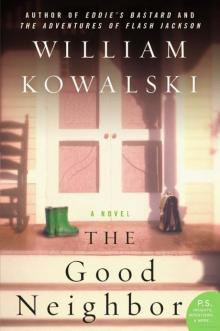 The Good Neighbor
The Good Neighbor Eddie's Bastard
Eddie's Bastard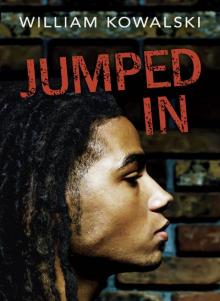 Jumped In
Jumped In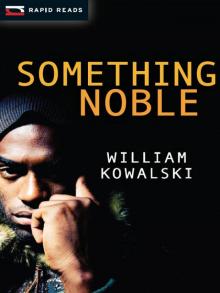 Something Noble
Something Noble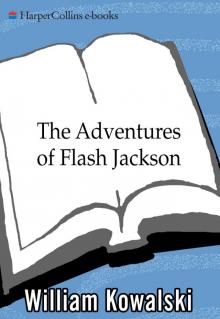 The Adventures of Flash Jackson
The Adventures of Flash Jackson Just Gone
Just Gone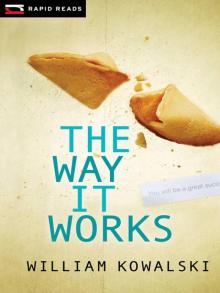 The Way It Works
The Way It Works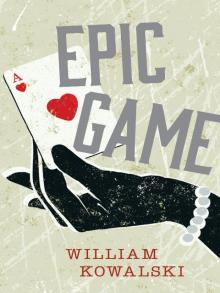 Epic Game
Epic Game